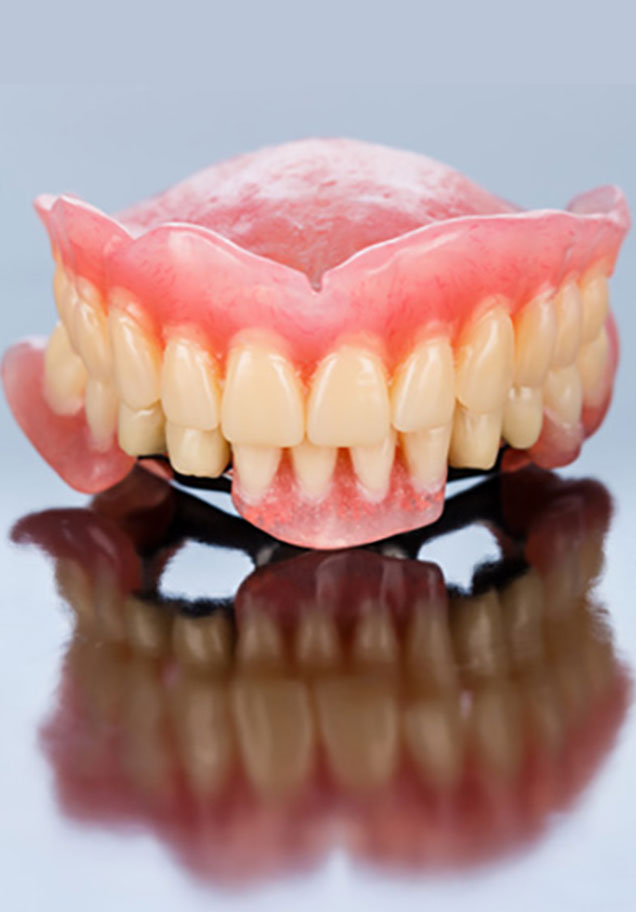If you miss a greater number of teeth, there are several ways to solve the problem and have a dazzling smile again. The most modern way is certainly dental implants. However, due to their high price, patients prefer to opt for a more accessible solution – mobile dental prosthetics, i.e. partial and total dental prostheses.
The specificity of dental prostheses is that they can be removed from mouth, which is why they are called mobile dental prosthetics for missing teeth. Patients put them on and take them off for oral hygiene. Depending on whether several teeth or all the teeth are being replaced, there are two types of prostheses. There are total and partial dental prostheses.
Price list
Specialist examination
4.000 RSD
Complete dentures
28.000 RSD
Acrylic partial denture
25.000 RSD
Partial skeletal denture
44.000 RSD
Immediate prosthesis
15.000 RSD
Complete denture with a metal base
30.000 RSD
Valplast denture
37.000 RSD
Direct denture foundation
5.500 RSD
Indirect denture support
10.000 RSD
Make an appointment

Total dental prostheses
Total dental prostheses are intended for people who do not have any tooth in a jaw. Total prostheses compensate for all the missing teeth, but also a part of an alveolar ridge. This is also the only solution for people without teeth, unless they opt for dental implants. Total prostheses are made of acrylate and placed over gums, more precisely over upper and lower jaw bones. This way they completely compensate for a lack of teeth and lost bones. In addition to practical benefits in terms of eating easily, there is also a psychological and aesthetic motivation for using total prostheses. Well-designed total prostheses look completely natural and bring back self-confidence.
However, total prostheses have certain disadvantages. This type of prostheses is the least comfortable compared to all the other ways of recovering missing teeth. Furthermore, a longer adaptation period is required, since total prostheses is actually a foreign body in mouth to be adjusted to. Some patients claim that the total prostheses have reduced their sense of taste, especially since they cover their palates. Of course, this is not a rule, it depends on a patient. In addition, total prostheses can also move, especially in a lower jaw. This is not a rule, but it also occurs only in individual cases.
These problems can certainly create an inconvenience while wearing total prostheses. On the other hand, for people who have a complete lack of teeth, a total prosthesis is certainly the right solution to enable them easier eating, but also restore self-confidence and smile on their face.
Partial dental prostheses
If you only miss a few teeth, but there is no possibility of making a bridge, the solution is a partial dental prosthesis. Unlike total tooth prostheses, partial prostheses are attached to surrounding teeth by metal parts, so-called “hooks”. In this way, prostheses are stable and do not move.
There are two types of partial dental prostheses – acrylic and skeletal partial dental prostheses. Partial acrylic prostheses are made of acrylic and, therefore, less durable than partial skeletal (wisil) prostheses with a metal part – skeleton. Partial skeletal prostheses are also more comfortable, because they rely less on palate and sublingual area. Consequently, the period of adaptation to this type of prostheses is much shorter. Similarly, in skeletal prostheses, molded hooks are used to attach prostheses, which make them more stable than acrylic prosthesis. Additionally, there is a possibility that partial skeletal dental prostheses are bound with buckles (attachments). Their one part is in the inner part of prostheses, and the other part on a tooth which allows even greater stability of prostheses. Skeletal partial dental prostheses can be used together with fixed dental prostheses, such as crowns and bridges.
Certainly the best and most contemporary solution is prostheses that are fixed by implants. However, a completely acceptable solution, especially in financial terms, is a total dental prosthesis for people who lack all the teeth, or a partial prosthesis for people who lack only a few teeth.
If you are still in doubt about the best solution for you, our expert team will be happy to help you. Call us and schedule consultations and after a check-up we will together find a solution that suits you most. In any case, both total and partial prostheses will enable you to eat without problems and have a confident bright smile again.


